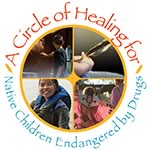Programs To Support Tribal Communities
The Vision 21 Report emphasized the need for the field to address the historical, institutional, geographic, and cultural barriers that may prevent victims from receiving services. OVC is committed to responding to the critical need for victim-centered assistance throughout Indian Country. In FYs 2013 and 2014, OVC supported community-based services for American Indian/Alaska Native (AI/AN) victims, and training and technical assistance for their service providers, through the following activities:
- Demonstration Project at Flandreau Indian School (2010–2014)
- Tribal Community Wellness Centers
- 14th National Indian Nations Conference (2014)
- AI/AN Training and Technical Assistance Program
- Vision 21: 2014 Linking Systems of Care for Children & Youth
- FY 2014 Vision 21: Building State Technology Capacity
Demonstration Project at Flandreau Indian School
Since 2010, OVC has supported efforts to establish a culturally relevant, trauma-informed system of care for students at the Flandreau Indian School (FIS), a Bureau of Indian Education-operated boarding school in Flandreau, South Dakota. Students at the school represent tribes from across the Nation, and many students have experienced long-term exposure to violence, trauma, and victimization. Through the 5-year Interagency Agreement, FIS and OVC are collaborating to help ensure that these students receive essential support and tools to heal from their past experiences, learn healthy coping mechanisms, connect with their culture, and reach their full potential. Through this project, FIS integrated traditional cultural activities into its extracurricular offerings, provided students with an opportunity to participate in an equine-assisted therapy program, and supplied training to faculty and staff on how to recognize and appropriately respond to symptoms of trauma and victimization among FIS students.
Tribal Community Wellness Centers
Through Congressionally appropriated Vision 21 funding in FY 2014, OVC awarded grants to three tribes for innovative projects to develop community wellness, victim-centered strategies that include a Community Wellness Center as a central organizing force within the tribal jurisdiction. The program, Vision 21: 2014 Tribal Community Wellness Centers: Serving Crime Victims’ Needs, supports the development of needs assessments, strategic plans, and strategies to expand current crime victim assistance programs in ways that will address a broader range of victim challenges. This innovative approach addresses underlying factors—such as poverty, historical trauma, substance abuse, health disparities, and lack of economic and educational opportunities—that may contribute to violence in communities.
14th National Indian Nations Conference (2014)
 OVC funded the 14th National Indian Nations Conference: Justice for Victims of Crime, held in December 2014 on the Agua Caliente Band of Cahuilla Indians Reservation in California. Coordinated by the Tribal Law and Policy Institute, the conference has been held every 2 years since 1988 and serves as the largest DOJ-sponsored tribal conference. The 2014 conference theme, “Generational Voices Uniting for Safety, Justice, and Healing,” focused on various aspects of the human life cycle, particularly two of the most vulnerable groups: children and older adults. The conference welcomed more than 1,000 attendees—tribal leaders, victims, victim advocates, and volunteers from tribal communities as well as many federal and state agency leaders and staff—who led and participated in a myriad of workshops to discuss strategies for improving responses to these issues, including elder abuse, through tribal laws and forensic interviewing of child victims. In addition to the many dignitaries and leaders who addressed the conference, Federal Bureau of Investigation (FBI) Director James Comey provided the keynote address, outlining their efforts to pursue and capture perpetrators in Indian Country and the FBI’s commitment to helping prevent future crimes and serving the victims.
OVC funded the 14th National Indian Nations Conference: Justice for Victims of Crime, held in December 2014 on the Agua Caliente Band of Cahuilla Indians Reservation in California. Coordinated by the Tribal Law and Policy Institute, the conference has been held every 2 years since 1988 and serves as the largest DOJ-sponsored tribal conference. The 2014 conference theme, “Generational Voices Uniting for Safety, Justice, and Healing,” focused on various aspects of the human life cycle, particularly two of the most vulnerable groups: children and older adults. The conference welcomed more than 1,000 attendees—tribal leaders, victims, victim advocates, and volunteers from tribal communities as well as many federal and state agency leaders and staff—who led and participated in a myriad of workshops to discuss strategies for improving responses to these issues, including elder abuse, through tribal laws and forensic interviewing of child victims. In addition to the many dignitaries and leaders who addressed the conference, Federal Bureau of Investigation (FBI) Director James Comey provided the keynote address, outlining their efforts to pursue and capture perpetrators in Indian Country and the FBI’s commitment to helping prevent future crimes and serving the victims.
 In 2014, OVC released A Circle of Healing for Native Children Endangered by Drugs, an innovative video series that shows examples of successful programs and practices developed by tribal communities and used throughout Indian Country to help drug-endangered AI/AN youth heal from trauma. Debuting at the 14th National Indian Nations Conference, the seven videos feature tribal leaders, service providers, and survivors who share testimonials to inform and guide tribal communities as they help traumatized children heal from the lasting consequences of exposure to drugs and alcohol in the home. The video series and companion resource guide are intended to stimulate discussion and inspire communities to come together to develop, enhance, and share their own responses to these issues and to help families recover from trauma and rebuild their lives. A preview of the video series is available on OVC’s Web site.
In 2014, OVC released A Circle of Healing for Native Children Endangered by Drugs, an innovative video series that shows examples of successful programs and practices developed by tribal communities and used throughout Indian Country to help drug-endangered AI/AN youth heal from trauma. Debuting at the 14th National Indian Nations Conference, the seven videos feature tribal leaders, service providers, and survivors who share testimonials to inform and guide tribal communities as they help traumatized children heal from the lasting consequences of exposure to drugs and alcohol in the home. The video series and companion resource guide are intended to stimulate discussion and inspire communities to come together to develop, enhance, and share their own responses to these issues and to help families recover from trauma and rebuild their lives. A preview of the video series is available on OVC’s Web site.
AI/AN Training and Technical Assistance Program
The OVC AI/AN Training and Technical Assistance (TTA) Program supports OVC’s Children’s Justice Act Partnerships for Indian Communities and Comprehensive Tribal Victim Assistance Program sites—funded under the Coordinated Tribal Assistance Solicitation (CTAS)—and other tribal communities, as appropriate, to enhance their capacity to coordinate and provide a comprehensive array of culturally appropriate services to victims of crime, their families, and their communities. The incumbent TTA provider, Unified Solutions Tribal Community Development Group, Inc., has provided support to the 44 current CTAS grantees to continue to develop and deliver an appropriate approach for each site, integrating what is learned from site visits into the development of promising practices, successful partnerships, and interventions.
Vision 21: 2014 Linking Systems of Care for Children & Youth
In accordance with the findings in the Vision 21 Report and the Report of the Attorney General’s National Task Force on Children Exposed to Violence, OVC awarded grants under the Vision 21: 2014 Linking Systems of Care for Children & Youth competitive solicitation in 2014. The initiative is designed to encourage relevant institutions, systems, and professionals to come together to design and carry out a coordinated approach to serving child and youth victims. The approach is designed to help ensure that the various child-serving institutions and systems—including child welfare, juvenile justice, mental health, and education—establish sustainable policies and practices to assess children and youth for victimization and provide comprehensive and coordinated services to address their needs. The initiative is divided into two phases—Phase I: Planning (1 month) and Phase II: Implementation (5 years, funded in 15-month increments)—and consists of three elements: state-level demonstration sites, technical assistance, and evaluation. OVC made its first awards for this program in 2014 by funding two state-level demonstration sites and a technical assistance provider. OVC also provided funding to the National Institute of Justice to evaluate the effectiveness of both the demonstration sites and the TA approach.
FY 2014 Vision 21: Building States’ Technology Capacity
OVC continues to support state VOCA administering agencies’ increased access to technology, victims’ access to state resources, and the accuracy of agencies’ administrative reporting. Under its FY 2014 Vision 21: Building State Technology Capacity program, OVC, through congressionally appropriated Vision 21 funding, provided $2.4 million in grants to 13 state VOCA administering agencies with gaps in technology, that limited their ability to report accurate and timely data and adversely affected victims’ ability to access resources. The awards support the use of technology to upgrade data-reporting systems, increase access to victim services, enhance electronic case management, streamline the administrative burden on service providers, and increase access to online, evidence-based training.








